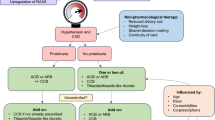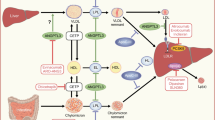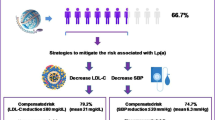Abstract
Tailoring therapeutic targets to patients’ risk is a fundamental principle of many coronary heart disease (CHD) treatment guidelines. Although the National Cholesterol Education Program’s guidelines do not include chronic kidney disease (CKD) as a CHD risk equivalent, the National Kidney Foundation and American Heart Association have recommended its inclusion in the highest-risk grouping for the prevention and treatment of cardiovascular disease. In three population-based studies, the risk of cardiovascular disease was higher among participants with established CHD when compared to their counterparts with CKD. Although there are other reasons for including CKD as a CHD risk equivalent in treatment guidelines (eg, higher case fatality rates from CHD and stroke), the inclusion of CKD as a CHD risk equivalent has treatment implications for a large number of US adults. Randomized trials assessing the benefits and drawbacks of aggressive CHD risk reduction among patients with CKD are needed.

Similar content being viewed by others
References
Papers of particular interest, published recently, have been highlighted as follows: • Of importance •• Of major importance
Executive Summary of the Third Report of the National Cholesterol Education Program (NCEP) Expert Panel on Detection, Evaluation, and Treatment of High Blood Cholesterol in Adults (Adult Treatment Panel III). JAMA 2001, 285:2486-2497.
Grundy SM, Cleeman JI, Merz CN, et al.: Implications of recent clinical trials for the National Cholesterol Education Program Adult Treatment Panel III guidelines. Circulation 2004, 110:227–239. (Published erratum appears in Circulation 2004, 110:763.)
Coresh J, Selvin E, Stevens LA, et al.: Prevalence of chronic kidney disease in the United States. JAMA 2007, 298:2038–2047.
Foley RN, Murray AM, Li S, et al.: Chronic kidney disease and the risk for cardiovascular disease, renal replacement, and death in the United States Medicare population, 1998 to 1999. J Am Soc Nephrol 2005, 16:489–495.
Glassock RJ, Winearls C: Diagnosing chronic kidney disease. Curr Opin Nephrol Hypertens 2009 (epub ahead of print).
K/DOQI clinical practice guidelines for management of dyslipidemias in patients with kidney disease. Am J Kidney Dis 2003, 41(4 Suppl 3):I–IV, S1–S91.
Sarnak MJ, Levey AS, Schoolwerth AC, et al.: Kidney disease as a risk factor for development of cardiovascular disease: a statement from the American Heart Association Councils on Kidney in Cardiovascular Disease, High Blood Pressure Research, Clinical Cardiology, and Epidemiology and Prevention. Hypertension 2003, 42:1050–1065.
United States Renal Data System (USRDS): USRDS 2005 Annual Data Report: Atlas of End-Stage Renal Disease in the United States. Bethesda, MD: National Instistutes of Health, National Institute of Diabetes and Digestive and Kidney Diseases; 2006.
Foley RN, Parfrey PS, Sarnak MJ: Clinical epidemiology of cardiovascular disease in chronic renal disease. Am J Kidney Dis 1998, 32(5 Suppl 3):S112–S119.
Tonelli M, Wiebe N, Culleton B, et al.: Chronic kidney disease and mortality risk: a systematic review. J Am Soc Nephrol 2006, 17:2034–2047.
Muntner P, He J, Hamm L, et al.: Renal insufficiency and subsequent death resulting from cardiovascular disease in the United States. J Am Soc Nephrol 2002, 13:745–753.
McCullough PA, Li S, Jurkovitz CT, et al.: CKD and cardiovascular disease in screened high-risk volunteer and general populations: the Kidney Early Evaluation Program (KEEP) and National Health and Nutrition Examination Survey (NHANES) 1999–2004. Am J Kidney Dis 2008, 51(4 Suppl 2):S38–S45.
Weiner DE, Tighiouart H, Amin MG, et al.: Chronic kidney disease as a risk factor for cardiovascular disease and all-cause mortality: a pooled analysis of community-based studies. J Am Soc Nephrol 2004, 15:1307–1315.
Wattanakit K, Coresh J, Muntner P, et al.: Cardiovascular risk among adults with chronic kidney disease, with or without prior myocardial infarction. J Am Coll Cardiol 2006, 48:1183–1189.
•• Rashidi A, Sehgal AR, Rahman M, O'Connor AS: The case for chronic kidney disease, diabetes mellitus, and myocardial infarction being equivalent risk factors for cardiovascular mortality in patients older than 65 years. Am J Cardiol 2008, 102:1668–1673. This study evaluates whether stage 3 CKD confers the same risk for CHD as a prior history of CHD or diabetes.
Islam TM, Fox CS, Mann D, Muntner P: Age-related associations of hypertension and diabetes mellitus with chronic kidney disease. BMC Nephrol 2009, 10:17.
•• Parikh NI, Hwang SJ, Larson MG, et al.: Chronic kidney disease as a predictor of cardiovascular disease (from the Framingham Heart Study). Am J Cardiol 2008, 102:47–53. This study evaluates whether an eGFR less than 45 mL/min/1.73 m 2 confers the same risk for CHD as a prior history of CHD.
Culleton BF, Hemmelgarn BR: Is chronic kidney disease a cardiovascular disease risk factor? Semin Dial 2003, 16:95–100.
Culleton BF, Larson MG, Wilson PW, et al.: Cardiovascular disease and mortality in a community-based cohort with mild renal insufficiency. Kidney Int 1999, 56:2214–2219.
Perkovic V, Verdon C, Ninomiya T, et al.: The relationship between proteinuria and coronary risk: a systematic review and meta-analysis. PLoS Med 2008, 5:e207.
• Foster MC, Hwang SJ, Larson MG, et al.: Cross-classification of microalbuminuria and reduced glomerular filtration rate: associations between cardiovascular disease risk factors and clinical outcomes. Arch Intern Med 2007, 167:1386–1392. This study demonstrates that reduced eGFR and albuminuria, when present together, increase the risk for cardiovascular disease.
Baber U, Mann D, Shimbo D, et al.: Combined role of reduced estimated glomerular filtration rate and microalbuminuria on the prevalence of peripheral arterial disease. Am J Cardiol 2009, 104:1446–1451.
Haffner SM, Lehto S, Ronnemaa T, et al.: Mortality from coronary heart disease in subjects with type 2 diabetes and in nondiabetic subjects with and without prior myocardial infarction. N Engl J Med 1998, 339:229–234.
Evans JM, Wang J, Morris AD: Comparison of cardiovascular risk between patients with type 2 diabetes and those who had had a myocardial infarction: cross sectional and cohort studies. BMJ 2002, 324:939–942. (Published erratum appears in BMJ 2002, 324:1357.)
Eberly LE, Cohen JD, Prineas R, Yang L: Impact of incident diabetes and incident nonfatal cardiovascular disease on 18-year mortality: the multiple risk factor intervention trial experience. Diabetes Care 2003, 26:848–854.
•• Bulugahapitiya U, Siyambalapitiya S, Sithole J, Idris I: Is diabetes a coronary risk equivalent? Systematic review and meta-analysis. Diabetes Med 2009, 26:142–148. This study demonstrates that despite being included in guidelines as a CHD risk equivalent, diabetes does not confer an equal risk as a prior history of coronary disease.
Grundy SM: Diabetes and coronary risk equivalency: what does it mean? Diabetes Care 2006, 29:457–460.
•• Hyre AD, Fox CS, Astor BC, et al.: The impact of reclassifying moderate CKD as a coronary heart disease risk equivalent on the number of US adults recommended lipid-lowering treatment. Am J Kidney Dis 2007, 49:37–45. This study shows the large number of patients with CKD would be recommended for aggressive treatment if it were reclassified as a CHD risk equivalent.
Tonelli M: Should CKD be a coronary heart disease risk equivalent? Am J Kidney Dis 2007, 49:8–11.
• Strippoli GF, Navaneethan SD, Johnson DW, et al.: Effects of statins in patients with chronic kidney disease: meta-analysis and meta-regression of randomised controlled trials. BMJ 2008, 336:645–651. (Published erratum appears in BMJ 2009, 339:b2951.)
Baigent C, Landry M: Study of Heart and Renal Protection (SHARP). Kidney Int Suppl 2003, 84:S207–S210.
Disclosure
No potential conflicts of interest relevant to this article were reported.
Author information
Authors and Affiliations
Corresponding author
Rights and permissions
About this article
Cite this article
Muntner, P., Farkouh, M.E. Chronic Kidney Disease as a Coronary Heart Disease Risk Equivalent. Curr Cardio Risk Rep 4, 136–141 (2010). https://doi.org/10.1007/s12170-010-0088-6
Published:
Issue Date:
DOI: https://doi.org/10.1007/s12170-010-0088-6




